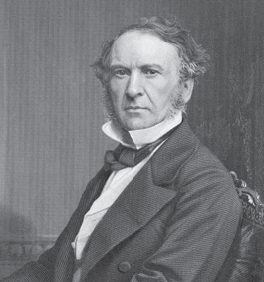William Gladstone (1809–1898) was one of the longest-serving prime ministers of Great Britain. He served four terms in the mid-nineteenth century and compiled a record as a Liberal reformer who expanded democratic institutions during the Victorian era and tried to enhance the political rights of the Irish.

He was also known for his long-standing rivalry with Conservative leader and two-time prime minister Benjamin Disraeli (1804–1881). The men were bitter enemies—both politically and personally. Disraeli referred to Gladstone as “the arch-villain” and suspected he was insane; Gladstone considered his rival an insufferable dandy.
Born in Liverpool, Gladstone attended Eton and Oxford, the breeding grounds for British politicians. He was first elected to Parliament in 1832 as a Tory and served in the Conservative cabinet as chancellor of the exchequer in 1852.
Gladstone first met Disraeli at a dinner party in London in 1835. Although the two ambitious young politicians were political allies at the time, their personalities clashed almost immediately: Gladstone was an earnest, deeply religious Christian with little sense of humor, while Disraeli was a combative, often sarcastic speaker with few religious convictions.
After drifting to the left in the 1850s, Gladstone switched to the Liberals in 1859 and was elected party leader in 1867. The next year, the Liberals won the general election, and he was named prime minister—replacing Disraeli. During his first term, Gladstone passed several bills that eased the restrictions on Roman Catholics in Ireland, established an elementary school system, and reduced the income tax. But Disraeli defeated him in a landslide in 1874. In defeat, Gladstone became a sharp critic of Disraeli’s government and accused him of turning a blind eye to Turkish repression in Bulgaria. He was returned to the premiership in 1880, and again in 1886 and 1892.
By the end of his career, Gladstone—nicknamed GOM, for the Grand Old Man—had become synonymous with British liberalism. He was accorded a state funeral after his death in Wales at age eighty-eight.
ADDITIONAL FACTS
- Like many other British politicians, Gladstone was sympathetic to the Southern side during the US Civil War. He gave a speech supporting the Confederacy in 1862—a stance he later claimed to regret.
- Queen Victoria (1819–1901), who was often appalled by Gladstone’s policies, once referred to him as a “half-mad firebrand.”
- Among British prime ministers, Gladstone trails only Winston Churchill (1874–1965) in length of time served in Parliament. Churchill was a member for sixty-three years and 358 days, compared with sixty-two years and 206 days for Gladstone.
